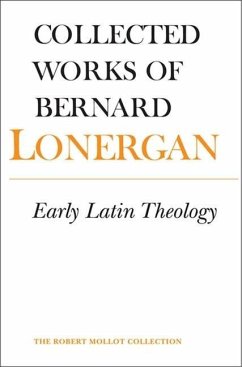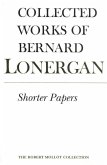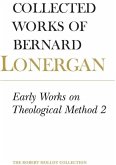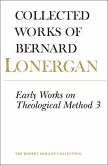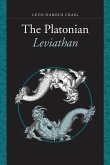Early Latin Theology (eBook, PDF)
Volume 19
Redaktion: Doran, Robert; S. J.; Monsour, H. Daniel


Alle Infos zum eBook verschenken

Early Latin Theology (eBook, PDF)
Volume 19
Redaktion: Doran, Robert; S. J.; Monsour, H. Daniel
- Format: PDF
- Merkliste
- Auf die Merkliste
- Bewerten Bewerten
- Teilen
- Produkt teilen
- Produkterinnerung
- Produkterinnerung

Hier können Sie sich einloggen

Bitte loggen Sie sich zunächst in Ihr Kundenkonto ein oder registrieren Sie sich bei bücher.de, um das eBook-Abo tolino select nutzen zu können.
Early Latin Theology presents seven of Bernard Lonergan's most important early theological works in English translation and the original Latin on facing pages under one cover for the first time.
LonerganBernard:
Bernard Lonergan (1904-1984), a professor of theology, taught at Regis College, Harvard University, and Boston College. An established author known for his Insight and Method in Theology , Lonergan received numerous honorary doctorates, was a Companion of the Order of Canada in 1971 and was named as an original member of the International Theological Commission by Pope Paul…mehr
- Geräte: PC
- ohne Kopierschutz
- eBook Hilfe
- Größe: 1.48MB
- FamilySharing(5)
![Shorter Papers (eBook, PDF) Shorter Papers (eBook, PDF)]() Bernard LonerganShorter Papers (eBook, PDF)90,95 €
Bernard LonerganShorter Papers (eBook, PDF)90,95 €![Early Works on Theological Method 2 (eBook, PDF) Early Works on Theological Method 2 (eBook, PDF)]() Bernard LonerganEarly Works on Theological Method 2 (eBook, PDF)89,95 €
Bernard LonerganEarly Works on Theological Method 2 (eBook, PDF)89,95 €![Religion, Redemption and Revolution (eBook, PDF) Religion, Redemption and Revolution (eBook, PDF)]() Wayne CristaudoReligion, Redemption and Revolution (eBook, PDF)111,95 €
Wayne CristaudoReligion, Redemption and Revolution (eBook, PDF)111,95 €![Early Works on Theological Method 3 (eBook, PDF) Early Works on Theological Method 3 (eBook, PDF)]() Bernard LonerganEarly Works on Theological Method 3 (eBook, PDF)61,95 €
Bernard LonerganEarly Works on Theological Method 3 (eBook, PDF)61,95 €![Reason and Revelation before Historicism (eBook, PDF) Reason and Revelation before Historicism (eBook, PDF)]() Sharon Jo PortnoffReason and Revelation before Historicism (eBook, PDF)77,95 €
Sharon Jo PortnoffReason and Revelation before Historicism (eBook, PDF)77,95 €![The Platonian Leviathan (eBook, PDF) The Platonian Leviathan (eBook, PDF)]() Leon Harold CraigThe Platonian Leviathan (eBook, PDF)100,95 €
Leon Harold CraigThe Platonian Leviathan (eBook, PDF)100,95 €![On Oligarchy (eBook, PDF) On Oligarchy (eBook, PDF)]() Toivu KoivukoskiOn Oligarchy (eBook, PDF)70,95 €
Toivu KoivukoskiOn Oligarchy (eBook, PDF)70,95 €-
-
-
LonerganBernard:
Bernard Lonergan (1904-1984), a professor of theology, taught at Regis College, Harvard University, and Boston College. An established author known for his Insight and Method in Theology, Lonergan received numerous honorary doctorates, was a Companion of the Order of Canada in 1971 and was named as an original member of the International Theological Commission by Pope Paul VI.
Doran, S.J.Robert:
Robert M. Doran is the Emmett Doerr Chair in Systematic Theology and a professor in the Department of Theology at Marquette University. He is the general editor of the Collected Works of Bernard Lonergan.
MonsourH. Daniel:
H. Daniel Monsour is an associate editor of the Collected Works of Bernard Lonergan and holds a PhD in theology from the University of Toronto.
ShieldsMichael:
Michael G. Shields is the librarian at the Lonergan Research Institute, Regis College, University of Toronto, and translator of several volumes in the Collected Works of Bernard Lonergan.
Dieser Download kann aus rechtlichen Gründen nur mit Rechnungsadresse in A, B, BG, CY, CZ, D, DK, EW, E, FIN, F, GR, HR, H, IRL, I, LT, L, LR, M, NL, PL, P, R, S, SLO, SK ausgeliefert werden.
- Produktdetails
- Verlag: University of Toronto Press
- Seitenzahl: 752
- Erscheinungstermin: 31. Oktober 2011
- Englisch
- ISBN-13: 9781442698079
- Artikelnr.: 48945751
- Verlag: University of Toronto Press
- Seitenzahl: 752
- Erscheinungstermin: 31. Oktober 2011
- Englisch
- ISBN-13: 9781442698079
- Artikelnr.: 48945751
- Herstellerkennzeichnung Die Herstellerinformationen sind derzeit nicht verfügbar.
ENGLISH TRANSLATION
Part 1: The Notion of Sacrifice
Introduction to ‘The Notion of Sacrifice,’ michael g. shields
1 The Definition of Sacrifice
2 Justification of This Definition
3 The Propriety of Symbols
4 First Application of the Definition
5 A Second Application of the Definition
6 The Causes of Sacrifice
7 The Difference between the Sacrifice of the Cross and the Mass
8 The Value of This Inquiry
Part 2: The Supernatural Order
From the 1973 Introduction to ‘De ente supernaturali,’ Regis Edition,
frederick e. crowe
[Introduction]
Thesis 1: There exists a created communication of the divine nature, which
is a created, proportionate, and remote principle whereby there are
operations in creatures through which they attain God as he is in himself.
Thesis 2: This created communication of the divine nature exceeds the
proportion not only of human nature but also of any finite substance, and
thus is absolutely supernatural.
Thesis 3: Acts, not only of the theological virtues but of other virtues as
well, inasmuch as they are elicited in the rational part of a person and in
accordance with one’s Christian duty, are specified by a supernatural
formal object, and therefore are absolutely supernatural as to their
substance and are so by reason of their formal object.
Excursus 1: Degrees among the supernatural acts themselves
Excursus 2: A note on purely entitative supernaturality
Thesis 4: Potency to the absolutely supernatural is obediential.
Excursus 1: On the natural desire to see God through his essence
Excursus 2: Supernatural acts as vital acts
Excursus 3: Divine concurrence
Excursus 4: The efficacy of divine concurrence
Thesis 5: Interior actual grace essentially consists in vital, principal,
and supernatural second acts of the intellect and the will.
Part 3: God’s Knowledge and Will
From the 1973 Introduction to ‘De scientia atque voluntate Dei,’ Regis
Edition, frederick e. crowe
1 The Aim of This Treatise
2 The Nature of Metaphysical Analysis
3 The Comparison between Eternal and Temporal Being
4 Immanent Contingent Operation
5 Action and Passion
6 Necessary and Contingent Being
7 Contingent Future Realities
8 Divine Transcendence
9 Principles of Priority and Simultaneity
10 God’s Knowledge
11 The Various Roots of Middle Knowledge
12 Order
13 The Meaning of Good and End
14 Evil
15 God’s Will
16 God’s Love
17 Efficient Causality
18 God’s Action
19 Other Opinions about God’s Action
20 Can God Be Accountable for the Formal Element of Sin?
21 God’s Antecedent Will
22 Other Conceptions of God’s Antecedent Will
23 Why God Allows Culpable Evil
24 Conceptual Designations in God (Signa Rationis)
25 Predestination and Reprobation
26 Objections
27 A Brief Summary of Principles
Part 4: Analysis of Faith
From the 1973 Introduction to ‘Analysis Fidei,’ Regis Edition, frederick e.
crowe
1 The Logical Process
2 The Psychological Process
3 The Reflective Act of Understanding
4 In the Psychological Faith Process the Reflective Act of Understanding Is
Pivotal
5 Difference between the Logical and the Psychological Process
6 Constraint of the Intellect and Rationalization
7 What Is the Analysis of Faith?
8 A Brief Overview
9 The Motive of Faith as Acquired
10 The Supernatural Formal Object
11 Those Who Believe Properly Attain a Supernatural Formal Object
12 An Alternative Explanation of the Above
13 Acts Which Immediately Precede Faith
14 Acts Which Remotely Precede Faith
15 The Grace of Conversion to Faith
16 The Properties of Faith
17 The Necessity of Faith
18 The Necessity of the Preambles of Faith
19 The Faith of Heretics, of Demons, and of Those Who Have Knowledge
20 The Meaning of ‘Right Reason Demonstrates the Truth of Faith’
Opinions
Page on the Necessity for the Preambles
Part 5: The Notion of Fittingness: The Application of Theological Method
to the Question of the Purpose of the Incarnation
1 The Notion of Fittingness
2 The Root of Fittingness
3 The Excellence of Order
4 The Conceptually Distinguished Formalities
5 The Fittingness of the Incarnation
6 The Necessity of the Incarnation
7 The Purpose of the Incarnation
Part 6: The Consciousness of Christ
From ‘Note on the Context of De conscientia Christi,’ frederick e. crowe
The Consciousness of Christ
Part 7: Supplementary Notes on Sanctifying Grace
Introductory Comments to ‘Supplementary Notes on Sanctifying Grace’
[1 Historical Sketch]
[1.1] Habitual Grace: Preliminary Notes
[1.2] The Nominalists
[1.3] The Sixteenth-Century Reformers
[1.4] The Way of Proceeding
[1.5] The Notion of Justice
2 The Positive Doctrine of Sacred Scripture
[Thesis 1:] To those whom God the Father loves [1] as he loves Jesus, his
only-begotten Son, (2) he gives the uncreated gift of the Holy Spirit, so
that (3) into a new life they may be (4) born again and (5) become living
members of Christ; therefore as (6) just, (7) friends of God, (8) adopted
children of God, and (9) heirs in hope of eternal life, (10) they enter
into a sharing in the divine nature.
3 Understanding the Faith
3.1 Sanctifying Grace: The Problem
[3.2] Preliminary Notes on the Nature of Sanctifying Grace: Notions
[3.2.1] Formal Cause and Formal Effects
[3.2.2] Divine Love
[Theorem 1:] All divine love as an effective principle is predicated
essentially and thus equally of the three divine Persons.
Corollary [to Theorem 1:] Absolutely all grace, inasmuch as it is related
to divine love as its effective principle, by that very fact is related not
to notional but to essential divine love.
[Theorem 2:] Not everything that is stated contingently about the divine
persons is stated by appropriation.
[3.2.3] The Ontological Foundation of Grace
[3.3] The Immanent Formal Effects of Sanctifying Grace
[3.4] The Transcendent Formal Effects of Sanctifying Grace
[3.5] Corollaries
Appendices
Appendix 1: ‘The Notion of Sacrifice’: Three Drafts on Theological Method
in Connection with the Idea of Sacrifice
Appendix 2: ‘God’s Knowledge and Will’
Editors’ Introduction
Appendix 2A
Appendix 2B
Index
LATIN TEXT
Pars 1: De Notione Sacrificii
1 Definitio Sacrificii
2 Definitionis Iustificatio
3 De Proprietate Symboli
4 Prima Definitionis Applicatio
5 Altera Definitionis Applicatio
6 De Causis Sacrificii
7 De Differentia Sacrificiorum Crucis et Missae
8 De Valore Peractae Inquisitionis
Pars 2: De Ente Supernaturali: Supplementum Schematicum
[Introductio]
Thesis I: Exsistit creata communicatio divinae naturae, seu principium
creatum, proportionatum, et remotum quo creaturae insunt operationes quibus
attingitur Deus uti in se est.
Thesis II: Haec creata divinae naturae communicatio non solum naturae
humanae sed etiam cuiuslibet finitae substantiae proportionem excedit
ideoque est supernaturalis simpliciter.
Thesis III:Quia actus non solum virtutum theologicarum sed etiam aliarum
virtutum, inquantum in parte rationali et sicut oportet a Christiano
eliciuntur, ab obiecto formali supernaturali specificantur, ideo
simpliciter supernaturales sunt quoad substantiam et quidem ratione obiecti
formalis.
Scholion I: De gradibus intra ipsos actus supernaturales
Scholion II: De supernaturalitate mere entitative
Thesis IV: Potentia ad supernaturalia simpliciter est obedientialis.
Scholion I: De naturali desiderio videndi Deum per essentiam
Scholion II: De actibus supernaturalibus qua vitalibus
Scholion III: De concursu divino
Scholion IV: De efficacia concursus divini
Thesis V: Gratia actualis interna essentialiter consistit in actibus
secundis intellectus et voluntatis vitalibus, principalibus, et
supernaturalibus.
Pars 3: De Scientia atque Voluntate Dei
1 De Fine Huius Operis
2 De Natura Analysis Metaphysicae
3 De Comparationis Entis Aeterni et Temporalis
4 Operatio Immanens et Contingens
5 De Actione et Passione
6 De Necessario et Contingente
7 De Futuris Contingentibus
8 De Transcendentia Divina
9 Principia Prioritatis et Simultaneitatis
10 De Scientia Dei
11 De Diversis Radicibus Scientiae Mediae
12 De Ordine
13 De Bono et Fine
14 De Malo
15 De Divina Voluntate
16 De Amore Divino
17 De Causa Efficiente
18 De Actione Divina
19 De Divina Actione Sententiae Aliae
20 Utrum Formale Peccati in Deum Reduci Possit
21 De Voluntate Dei Antecedente
22 Voluntatis Antecendentis Conceptiones Aliae
23 Cur Deus Malum Culpae Permittat
24 De Signis Rationis
25 De Praedestinatione et Reprobatione
26 Obiectiones
27 Principiorum Summula
Appendix 1
Pars 4: Analysis Fidei
1 Processus Logicus
2 Processus Psychologicus
3 Quid Sit Actus Intelligendi Reflexus
4 Quod in Processu Fidei Psychologico Cardo Est Actus Intelligendi Reflexus
5 Quantum Differunt Processus Logicus et Psychologicus
6 Quid Sit Coactio Intellectus et Quid Rationalizatio
7 Quid Sit Analysis Fidei
8 Brevis Conspectus
9 Motivum Fidei in Facto Fsse
10 De Obiecto Formali Supernaturali
11 Quod Qui Credit Sicut Oportet Obiectum Formale Supernaturale Attingit
12 Quod Iterum Aliter Ponitur
13 De Actibus Qui Proxime Fidem Antecedunt
14 De Actibus Qui Remote Fidem Antecedunt
15 De Gratia Conversionis ad Fidem
16 De Proprietatibus Fidei
17 De Necessitate Fidei
18 De Necessitate Praeambulorum
19 Circa Fidem in Haereticis, Diabolis, et Scientibus
20 Circa Illud, ‘Recta Ratio Fidei Veritatem Demonstrat’
Opiniones
Pars 5: De Ratione Convenientiae: Methodus Theologica ad Finem
Incarnationis Applicata
1 Quid Sit Convenientia
2 De Radice Convenientiae
3 De Excellentia Ordinis/
4 De Signis Rationis
5 De Convenientia Incarnationis
6 De Necessitate Incarnationis
7 Circa Finem Incarnationis
Pars 6: De Conscientia Christi
Pars 7: De Gratia Sanctificante. Supplementum
[1 Adlineamenta historica]
[1.1] De gratia habituali. Initia
[1.2] Nominales
[1.3] Novatores saec. xvi
[1.4] Modus procedendi
[1.5] De notione iustitiae
2 Positiva Sacrae Scripturae Doctrina
[Thesis I:] Quos diligit Deus Pater (1) sicut Iesum Filium suum unigenitum
diligit, (2) dono eos increato ipsius Spiritus sancti donat, ut (3) in
novam vitam (4) renati (5) viva Christi membra efficiantur; quare (6)
iusti, (7) Deo amici, (8) filii Dei adoptivi, et (9) haeredes secundum spem
vitae aeternae, (10) consortium divinae naturae ineunt.
3 Intelligentia Fidei
3.1 Gratia Sanctificans: Problema
[3.2] De Natura Gratiae Sanctificantis: Praenotamina
[3.2.1] De causa Formali et Effectibus Formalibus
[3.2.2] De Amore Divino
[Theorema I:] Essentialiter et ideo pariter de tribus personis dicitur
omnis amor divinus inquantum est principium effectivum.
Corollarium: Omnis prorsus gratia, inquantum respicit amorem divinum ut
principium effectivum, eo ipso respicit amorem non notionalem sed
essentialem.
[Theorema II:] Non omnia quae contingenter de divinis personis dicuntur,
per appropriationem dicuntur.
[3.2.3] De Fundamento Gratiae Ontologico
[3.3] Secundum effectus formales et immanentes
[3.4] Secundum effectus formales et transcendentales
[3.5] Corollaria
Appendix IIa
ENGLISH TRANSLATION
Part 1: The Notion of Sacrifice
Introduction to ‘The Notion of Sacrifice,’ michael g. shields
1 The Definition of Sacrifice
2 Justification of This Definition
3 The Propriety of Symbols
4 First Application of the Definition
5 A Second Application of the Definition
6 The Causes of Sacrifice
7 The Difference between the Sacrifice of the Cross and the Mass
8 The Value of This Inquiry
Part 2: The Supernatural Order
From the 1973 Introduction to ‘De ente supernaturali,’ Regis Edition,
frederick e. crowe
[Introduction]
Thesis 1: There exists a created communication of the divine nature, which
is a created, proportionate, and remote principle whereby there are
operations in creatures through which they attain God as he is in himself.
Thesis 2: This created communication of the divine nature exceeds the
proportion not only of human nature but also of any finite substance, and
thus is absolutely supernatural.
Thesis 3: Acts, not only of the theological virtues but of other virtues as
well, inasmuch as they are elicited in the rational part of a person and in
accordance with one’s Christian duty, are specified by a supernatural
formal object, and therefore are absolutely supernatural as to their
substance and are so by reason of their formal object.
Excursus 1: Degrees among the supernatural acts themselves
Excursus 2: A note on purely entitative supernaturality
Thesis 4: Potency to the absolutely supernatural is obediential.
Excursus 1: On the natural desire to see God through his essence
Excursus 2: Supernatural acts as vital acts
Excursus 3: Divine concurrence
Excursus 4: The efficacy of divine concurrence
Thesis 5: Interior actual grace essentially consists in vital, principal,
and supernatural second acts of the intellect and the will.
Part 3: God’s Knowledge and Will
From the 1973 Introduction to ‘De scientia atque voluntate Dei,’ Regis
Edition, frederick e. crowe
1 The Aim of This Treatise
2 The Nature of Metaphysical Analysis
3 The Comparison between Eternal and Temporal Being
4 Immanent Contingent Operation
5 Action and Passion
6 Necessary and Contingent Being
7 Contingent Future Realities
8 Divine Transcendence
9 Principles of Priority and Simultaneity
10 God’s Knowledge
11 The Various Roots of Middle Knowledge
12 Order
13 The Meaning of Good and End
14 Evil
15 God’s Will
16 God’s Love
17 Efficient Causality
18 God’s Action
19 Other Opinions about God’s Action
20 Can God Be Accountable for the Formal Element of Sin?
21 God’s Antecedent Will
22 Other Conceptions of God’s Antecedent Will
23 Why God Allows Culpable Evil
24 Conceptual Designations in God (Signa Rationis)
25 Predestination and Reprobation
26 Objections
27 A Brief Summary of Principles
Part 4: Analysis of Faith
From the 1973 Introduction to ‘Analysis Fidei,’ Regis Edition, frederick e.
crowe
1 The Logical Process
2 The Psychological Process
3 The Reflective Act of Understanding
4 In the Psychological Faith Process the Reflective Act of Understanding Is
Pivotal
5 Difference between the Logical and the Psychological Process
6 Constraint of the Intellect and Rationalization
7 What Is the Analysis of Faith?
8 A Brief Overview
9 The Motive of Faith as Acquired
10 The Supernatural Formal Object
11 Those Who Believe Properly Attain a Supernatural Formal Object
12 An Alternative Explanation of the Above
13 Acts Which Immediately Precede Faith
14 Acts Which Remotely Precede Faith
15 The Grace of Conversion to Faith
16 The Properties of Faith
17 The Necessity of Faith
18 The Necessity of the Preambles of Faith
19 The Faith of Heretics, of Demons, and of Those Who Have Knowledge
20 The Meaning of ‘Right Reason Demonstrates the Truth of Faith’
Opinions
Page on the Necessity for the Preambles
Part 5: The Notion of Fittingness: The Application of Theological Method
to the Question of the Purpose of the Incarnation
1 The Notion of Fittingness
2 The Root of Fittingness
3 The Excellence of Order
4 The Conceptually Distinguished Formalities
5 The Fittingness of the Incarnation
6 The Necessity of the Incarnation
7 The Purpose of the Incarnation
Part 6: The Consciousness of Christ
From ‘Note on the Context of De conscientia Christi,’ frederick e. crowe
The Consciousness of Christ
Part 7: Supplementary Notes on Sanctifying Grace
Introductory Comments to ‘Supplementary Notes on Sanctifying Grace’
[1 Historical Sketch]
[1.1] Habitual Grace: Preliminary Notes
[1.2] The Nominalists
[1.3] The Sixteenth-Century Reformers
[1.4] The Way of Proceeding
[1.5] The Notion of Justice
2 The Positive Doctrine of Sacred Scripture
[Thesis 1:] To those whom God the Father loves [1] as he loves Jesus, his
only-begotten Son, (2) he gives the uncreated gift of the Holy Spirit, so
that (3) into a new life they may be (4) born again and (5) become living
members of Christ; therefore as (6) just, (7) friends of God, (8) adopted
children of God, and (9) heirs in hope of eternal life, (10) they enter
into a sharing in the divine nature.
3 Understanding the Faith
3.1 Sanctifying Grace: The Problem
[3.2] Preliminary Notes on the Nature of Sanctifying Grace: Notions
[3.2.1] Formal Cause and Formal Effects
[3.2.2] Divine Love
[Theorem 1:] All divine love as an effective principle is predicated
essentially and thus equally of the three divine Persons.
Corollary [to Theorem 1:] Absolutely all grace, inasmuch as it is related
to divine love as its effective principle, by that very fact is related not
to notional but to essential divine love.
[Theorem 2:] Not everything that is stated contingently about the divine
persons is stated by appropriation.
[3.2.3] The Ontological Foundation of Grace
[3.3] The Immanent Formal Effects of Sanctifying Grace
[3.4] The Transcendent Formal Effects of Sanctifying Grace
[3.5] Corollaries
Appendices
Appendix 1: ‘The Notion of Sacrifice’: Three Drafts on Theological Method
in Connection with the Idea of Sacrifice
Appendix 2: ‘God’s Knowledge and Will’
Editors’ Introduction
Appendix 2A
Appendix 2B
Index
LATIN TEXT
Pars 1: De Notione Sacrificii
1 Definitio Sacrificii
2 Definitionis Iustificatio
3 De Proprietate Symboli
4 Prima Definitionis Applicatio
5 Altera Definitionis Applicatio
6 De Causis Sacrificii
7 De Differentia Sacrificiorum Crucis et Missae
8 De Valore Peractae Inquisitionis
Pars 2: De Ente Supernaturali: Supplementum Schematicum
[Introductio]
Thesis I: Exsistit creata communicatio divinae naturae, seu principium
creatum, proportionatum, et remotum quo creaturae insunt operationes quibus
attingitur Deus uti in se est.
Thesis II: Haec creata divinae naturae communicatio non solum naturae
humanae sed etiam cuiuslibet finitae substantiae proportionem excedit
ideoque est supernaturalis simpliciter.
Thesis III:Quia actus non solum virtutum theologicarum sed etiam aliarum
virtutum, inquantum in parte rationali et sicut oportet a Christiano
eliciuntur, ab obiecto formali supernaturali specificantur, ideo
simpliciter supernaturales sunt quoad substantiam et quidem ratione obiecti
formalis.
Scholion I: De gradibus intra ipsos actus supernaturales
Scholion II: De supernaturalitate mere entitative
Thesis IV: Potentia ad supernaturalia simpliciter est obedientialis.
Scholion I: De naturali desiderio videndi Deum per essentiam
Scholion II: De actibus supernaturalibus qua vitalibus
Scholion III: De concursu divino
Scholion IV: De efficacia concursus divini
Thesis V: Gratia actualis interna essentialiter consistit in actibus
secundis intellectus et voluntatis vitalibus, principalibus, et
supernaturalibus.
Pars 3: De Scientia atque Voluntate Dei
1 De Fine Huius Operis
2 De Natura Analysis Metaphysicae
3 De Comparationis Entis Aeterni et Temporalis
4 Operatio Immanens et Contingens
5 De Actione et Passione
6 De Necessario et Contingente
7 De Futuris Contingentibus
8 De Transcendentia Divina
9 Principia Prioritatis et Simultaneitatis
10 De Scientia Dei
11 De Diversis Radicibus Scientiae Mediae
12 De Ordine
13 De Bono et Fine
14 De Malo
15 De Divina Voluntate
16 De Amore Divino
17 De Causa Efficiente
18 De Actione Divina
19 De Divina Actione Sententiae Aliae
20 Utrum Formale Peccati in Deum Reduci Possit
21 De Voluntate Dei Antecedente
22 Voluntatis Antecendentis Conceptiones Aliae
23 Cur Deus Malum Culpae Permittat
24 De Signis Rationis
25 De Praedestinatione et Reprobatione
26 Obiectiones
27 Principiorum Summula
Appendix 1
Pars 4: Analysis Fidei
1 Processus Logicus
2 Processus Psychologicus
3 Quid Sit Actus Intelligendi Reflexus
4 Quod in Processu Fidei Psychologico Cardo Est Actus Intelligendi Reflexus
5 Quantum Differunt Processus Logicus et Psychologicus
6 Quid Sit Coactio Intellectus et Quid Rationalizatio
7 Quid Sit Analysis Fidei
8 Brevis Conspectus
9 Motivum Fidei in Facto Fsse
10 De Obiecto Formali Supernaturali
11 Quod Qui Credit Sicut Oportet Obiectum Formale Supernaturale Attingit
12 Quod Iterum Aliter Ponitur
13 De Actibus Qui Proxime Fidem Antecedunt
14 De Actibus Qui Remote Fidem Antecedunt
15 De Gratia Conversionis ad Fidem
16 De Proprietatibus Fidei
17 De Necessitate Fidei
18 De Necessitate Praeambulorum
19 Circa Fidem in Haereticis, Diabolis, et Scientibus
20 Circa Illud, ‘Recta Ratio Fidei Veritatem Demonstrat’
Opiniones
Pars 5: De Ratione Convenientiae: Methodus Theologica ad Finem
Incarnationis Applicata
1 Quid Sit Convenientia
2 De Radice Convenientiae
3 De Excellentia Ordinis/
4 De Signis Rationis
5 De Convenientia Incarnationis
6 De Necessitate Incarnationis
7 Circa Finem Incarnationis
Pars 6: De Conscientia Christi
Pars 7: De Gratia Sanctificante. Supplementum
[1 Adlineamenta historica]
[1.1] De gratia habituali. Initia
[1.2] Nominales
[1.3] Novatores saec. xvi
[1.4] Modus procedendi
[1.5] De notione iustitiae
2 Positiva Sacrae Scripturae Doctrina
[Thesis I:] Quos diligit Deus Pater (1) sicut Iesum Filium suum unigenitum
diligit, (2) dono eos increato ipsius Spiritus sancti donat, ut (3) in
novam vitam (4) renati (5) viva Christi membra efficiantur; quare (6)
iusti, (7) Deo amici, (8) filii Dei adoptivi, et (9) haeredes secundum spem
vitae aeternae, (10) consortium divinae naturae ineunt.
3 Intelligentia Fidei
3.1 Gratia Sanctificans: Problema
[3.2] De Natura Gratiae Sanctificantis: Praenotamina
[3.2.1] De causa Formali et Effectibus Formalibus
[3.2.2] De Amore Divino
[Theorema I:] Essentialiter et ideo pariter de tribus personis dicitur
omnis amor divinus inquantum est principium effectivum.
Corollarium: Omnis prorsus gratia, inquantum respicit amorem divinum ut
principium effectivum, eo ipso respicit amorem non notionalem sed
essentialem.
[Theorema II:] Non omnia quae contingenter de divinis personis dicuntur,
per appropriationem dicuntur.
[3.2.3] De Fundamento Gratiae Ontologico
[3.3] Secundum effectus formales et immanentes
[3.4] Secundum effectus formales et transcendentales
[3.5] Corollaria
Appendix IIa
